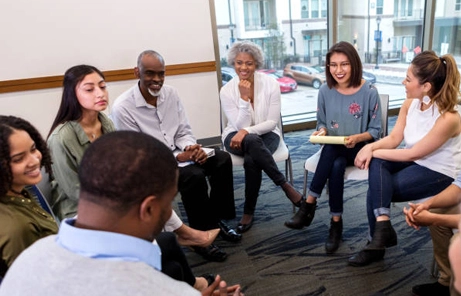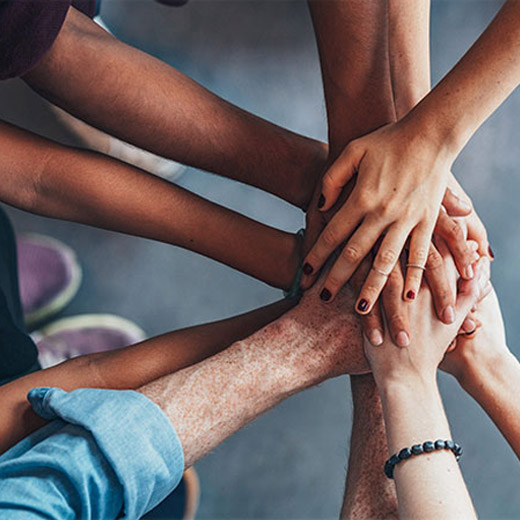When you or a loved one has an alcohol or drug addiction you may struggle to understand how to address it. Fortunately addiction is a treatable illness and by using proven and professional treatment methods, recovery from drug and alcohol addiction can be achieved.
On this page we further explain how an holistic treatment approach can encourage you or someone you care about to begin and sustain sober living.
What is Addiction Rehab (Rehabilitation)?
Addiction ‘rehab’ is the process of medical care and psychotherapeutic interventions to tackle your addiction to on substances like recreational drugs, prescription drugs and alcohol. Rehab treatment is more effective when it is tailored to your own needs involving a medical detox, inpatient and outpatient care, as well as relapse prevention techniques.

Facts & Statistics about Addiction in San Jacinto
Prevalence of Substance Use Disorder, by Drug Type
(IN THOUSANDS)
- 2,7578.5%Any Substance
- 2,0886.4%Alcohol
- 1,0683.3%Ilicit Drugs
- 2060.6%Pain Medication
Drug- and Alcohol-Induced Deaths by Age Group, California, 2016
- Alcohol-Induced
- Drug-Induced
- 18 to 250.5
- 9.6
- 26 to 354.3
- 13.9
- 36 to 6424.2
- 22.9
- 65+23.7
- 9.4
Drug Use, by Selected Type and Age Group California, 2015 to 2016
- 12 to 17
- 18 to 25
- 26+
- Marijuana*13.2%
- 34.0%
- 13.5%
- Misuse of Pain Medications3.5%
- 8.0%
- 4.3%
- Cocaine0.8%
- 7.2%
- 1.8%
- Heroin0%
- 0.4%
- 0.2%
What are the treatment options available in San Jacinto?
Understanding and healing the root causes behind your drug or alcohol use disorder can be achieved through the use of an holistic treatment model. It is important to treat the symptoms of addiction, but coping methods need to be implemented, in order for you to deal with the issues that lead to the drug or alcohol dependency.

Private Residential Programs
A residential treatment program allows you to live at the treatment center and receive all rehab treatment on the property. One of the main benefits is having round-the-clock treatment and support. There is notable value in removing yourself from the home environment and becoming fully engaged in the addiction treatment program, because you are no longer vulnerable to the stressors and triggers that may cause you to use drugs.
By remaining in a safe environment that is designed to be supportive, you have a better chance of successfully completing your treatment program while avoiding relapse and its potential risks. When you have a serious substance dependency, or you suffer from a dual diagnosis or co-occurring illness, a residential addiction treatment program is strongly recommended.
A residential addiction treatment program will help you in getting sober, but it’s important to note that maintaining sobriety requires persistent effort as the early stages of recovery are usually hard for many people. Once the residential program is complete you will learn how to be independent and your focus will be on your new journey and the things you want to achieve from life.
Do You Need Help?
Our addiction advisers are here to help you.

Sober Living Programs
Sober living rehab programs help you to have more control over your life, through guidance and supportive structures. The programs comprise of:
- A house manager to check in on you daily
- Develop guidelines for your behavior in recovery
- Support and new friendships from other individuals who are going through the same process as you.
Outpatient Programs
By engaging in an outpatient program you have a lot more flexibility, as you will visit the rehab facility for treatment weekly and continue work or family commitments.
Outpatient programs offer support through:
Detox Only Programs
The need for alcohol or drug detox from your body is the first stage of rehab, because it eliminates traces of the substance and puts an end to your physical dependence. You usually experience withdrawal symptoms as a normal reaction to the absence of drugs or alcohol in your body.
This process of detoxification starts the recovery phase, which will continue as you come to terms with the causes of your addictive behavior so that you can avoid repeating these damaging cycles in the future. A number of substances result in temporary cravings and withdrawal symptoms after you have been through drug or alcohol detox. Your risk of relapsing can be mitigated as you learn the skills necessary to cope with your new life.
Paying for Private Treatment
Private treatment needs to be paid out of pocket or claimed directly through your insurance. Many private insurance providers will contribute to a portion of the costs of a rehab program, which could help with a medical detox, rehab program and aftercare to help you in the early phase of recovery.
The amount of cover you can get will be set by your provider and your policy details. Always determine the amount you can claim against your policy before you take part in a treatment program. Visit our Verify Your Insurance page to learn about the cover you qualify for.
If you do not make a claim from your policy you must pay upfront for your rehab treatment. Some rehab centres include payment options to clients so that the cost can be spread out.
State Funded Programs
If you are battling with substance or alcohol dependency and limited financial means to fund private rehab, you might be accepted for a state-funded addiction rehabilitation program. These programs utilize government funds from state budgets, Medicaid and federal government to assist recovery by offering:
- Medically-assisted alcohol/drug detox
- Rehab treatment and aftercare services.
In order to take part in a state-funded treatment program you will need to give proof that you live in a low income household or that you do not have health insurance:
- Medical records that highlights your addiction issues
- Proof of where you live
- Proof of income
- Evidence that shows you can live in the US legally
More details about the application process can be found on https://www.grants.gov/
You can also find direct details to contact your state agency here.

The following state-funded addiction rehab programs are available in San Jacinto:
Riverside University Health System San Jacinto
1370 South State Street, Suite A , San Jacinto, CA 92583
951-791-3350
https://www.rcdmh.org/SaptRiverside San Bernardino County Indian Health/Soboba
607 Donna Way, San Jacinto, CA 92583
951-654-0803 x3220
http://www.rsbcihi.org/LaVista Alcohol/Drug Recovery Center A Division of MFI
2220 Girard Street, San Jacinto, CA 92583
951-925-8450 x1613
https://www.mfirecovery.com/
Maintaining Addiction Recovery in San Jacinto
Sustaining addiction recovery can be difficult once you embark on your new journey outside of rehab. At the rehab center the environment was safe and you had professional support. Once you leave rehab there may be new triggers that put your coping skills to the test. In our experience, clients with intense dependencies and those who do not develop the necessary support structure find long term recovery more difficult when they leave rehab. Relapse is a possibility without the right aftercare and support groups to help you navigate your new life.
The following AA/NA meetings are available in San Jacinto:
SAN JACINTO ARRID CLUB
Open: 468 West Main Street, San Jacinto, CA 92583
Thursday: 7:30 pm
https://www.drugstrategies.org/SAN JACINTO LYONS CLUB
Candlelight, Group Discussion, Participation and Open:
157 South Ramona Boulevard, San Jacinto, CA 92583
Tuesday: 7:30 pm
https://www.drugstrategies.org/AA - Sobriedad Y Salvasion
Spanish: 249 East Main Street, San Jacinto, CA, 92581
Sunday: 8:00 AM – 10:00 AM
https://alcoholicsanonymous.com/
Aftercare & Alumni Programs
An aftercare program continues to provide recovery support when you return to your home environment. Relapse can occur in up to 60% of people, and due mostly to the unpredictability of life outside of rehab, having extended support is an integral part of your journey in recovery.
As you get near to completing your treatment program, we will support you to establish an aftercare program that includes services that are helpful to your long-term recovery. Clients who complete their drug or alcohol treatment programs can join an alumni community program like ours, which gives you the chance to interact with staff and others in early recovery.
You can attend addiction recovery events, join groups and receive support and motivation from other individuals who are also in recovery as well. We encourage you to consider supporting other former clients in your network if you feel comfortable to.

Support Groups (Fellowship Meetings)
Support groups are paramount to long-term sobriety as they monopolize on the need for social interactions in recovery. Some of the most important support groups are Alcoholics Anonymous and Narcotics Anonymous, which benefit from the 12-steps to help individuals in recovery through local meetings.
When you attend support group meetings, you will be able to share your experiences and feel empowered by other individuals who are also in recovery. Companionship, empowerment and taking responsibility for our actions are key to long-term recovery, and support groups provide many with the necessary tools to stay sober.
Support for Families & Children Affected by Addiction
Addiction causes pain for everyone living in the household to various degrees. While the person battling with dependence certainly needs all the help they can get, other family members also need counseling. Support groups for families has two key benefits: you can help yourself and the person overcoming substance dependence.
Families can benefit from participating in support groups such as:
- NAMI Family Support Groups
- Al-Anon
- Families Anonymous
- Alateen
- Nar-Anon
- Parents of Addicted Loved Ones
- SMART Recovery Family & Friends










